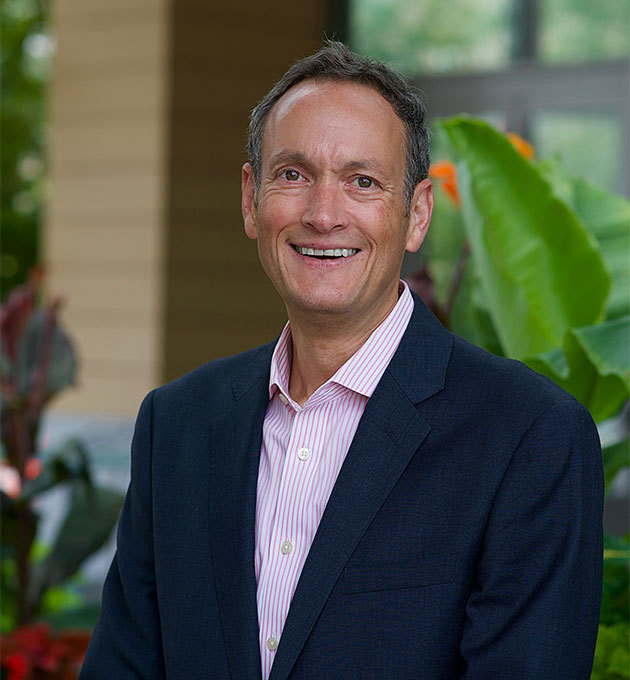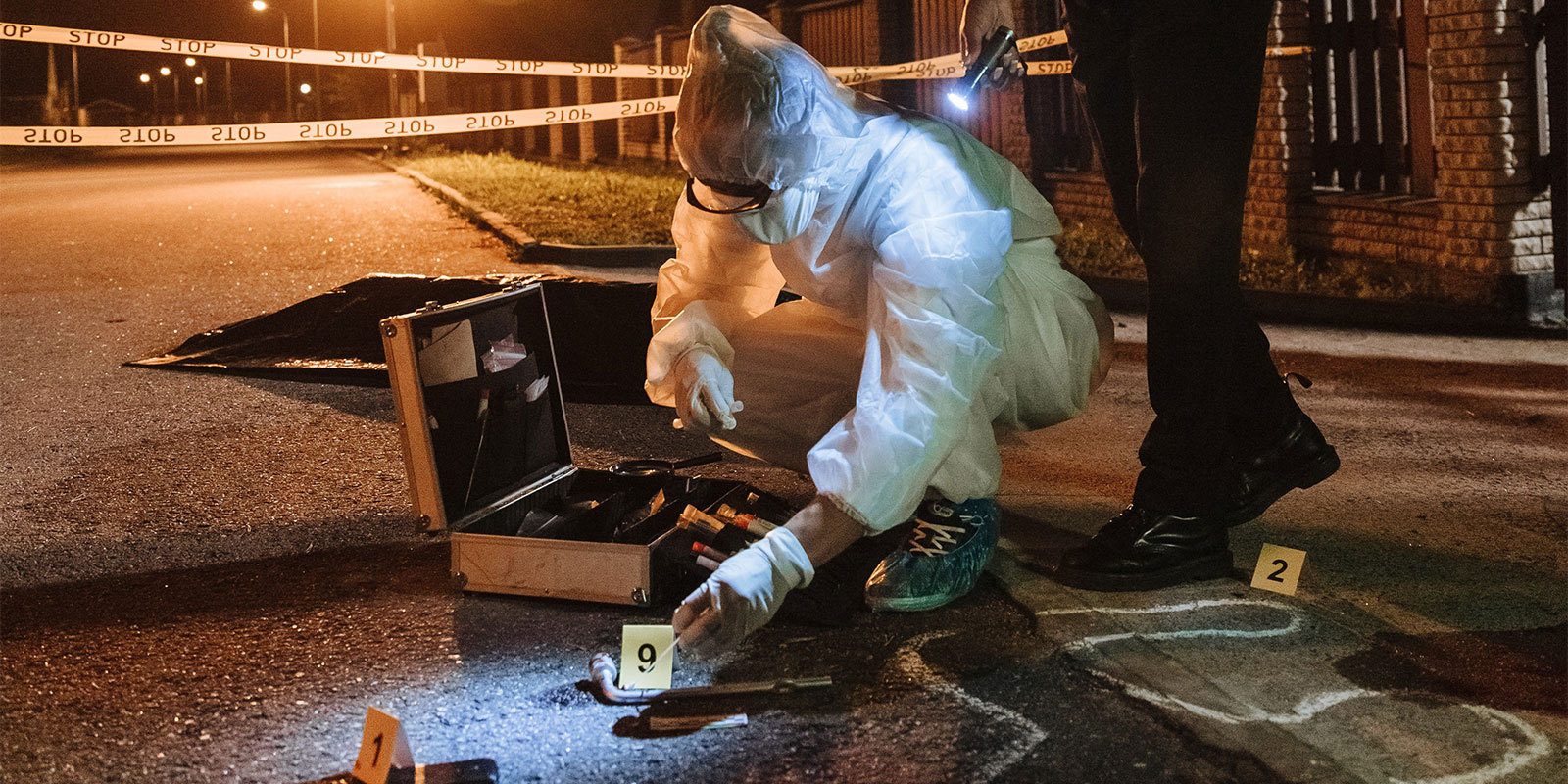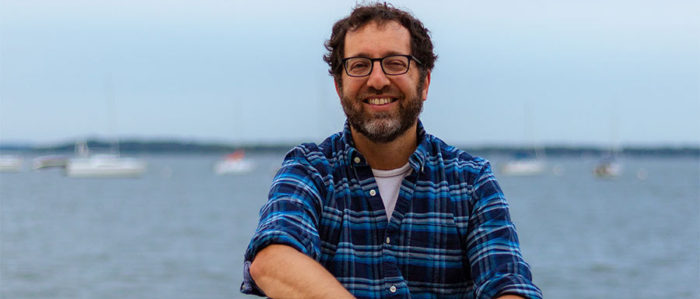In a way, you could say the class Ralph Grunewald is teaching this fall was thrust upon him.
Every year, the 300-400 students in Grunewald’s Criminal Justice 131 course would pepper him with questions sparked by the true crime shows and podcasts they voraciously consumed.
“They would ask me, ‘Why did they allow this box to be admitted into evidence? Why did they need a warrant for this?’’’ says Grunewald, an associate professor of English who holds a law degree and PhD earned in his native Germany and splits his teaching duties with the UW Center for Law, Society and Justice. “I really got intrigued by those questions. I find the intersection between law and narrative fascinating.”

That's when Grunewald started developing Truth and Crime, a class housed in the College of Letters & Science’s Constellations Program. Over the next few months, he and his students will explore the intersectionality of true crime with law, the media and social media, and how the narratives that drive each of them are constructed.
Grunewald couldn’t have picked a better time to teach the class. While it’s true that we’ve always been fascinated with crime, in the modern era, the true crime genre continues to explode. Thousands of books, streaming shows, videos and podcasts obsess over it. “My Favorite Murder,” the popular comedy-tinged true crime podcast, racked up $15 million in profits a few years ago.
Grunewald admits he doesn’t consume true crime media to the degree his students do, but he is a devotee of narratology, the study of the structure and function of narrative themes and conventions. Grunewald authored a book on the subject, exploring the role narrative often serves in wrongful convictions. In this topic, the professor has had first-hand experience, having worked with the Wisconsin Innocence Project while obtaining his advanced law degree at UW–Madison.
The true crime genre relies on the tension between dubious speculation (a sport in which most of us engage in regularly) and the claim to truth — that’s why Grunewald’s course is titled Truth and Crime, not True Crime. His students won’t just learn about criminal justice or law and literature. They’ll develop the skills to recognize how true crime narratives are created.
“There are people who are extremely skillful in putting these stories together, and we never think of them,” says Grunewald. “What’s the narrator’s agenda? What’s the editor’s agenda? How we represent certain events is not arbitrary.”
Grunewald is fascinated by the ways in which what he calls the “narrative blueprint” — a term that encompasses the ways stories are told, transferred and presented in court — is now much more in the hands of true crime podcasters than forensic scientists and legal teams. And many of those podcasters and producers are bringing a commercial interest to the party. Bailey Sarian, a popular YouTuber who breaks down crimes while doing her makeup in “Murder, Mystery and Makeup,” boasts nearly 7 million subscribers — which means it’s in her interest to make her stories and presentation as dramatic as possible.
“A hundred years ago, people who had social agency and social clout and leverage could narrate,” Grunewald says. “They were the ones who were literate and had access to media. Now agency comes from narration. Everyone can make a podcast.”
One of the examples Grunewald intends to use in class is the case of Michelle Carter, the 17-year-old who was convicted of involuntary manslaughter in 2017 for urging her then-boyfriend Conrad Roy to commit suicide through text messages. Media portrayals of the case were copious (and continue to be produced), including the Lifetime movie “Conrad & Michelle: If Words Could Kill,” an effort that used narrative license to skew some of the facts. He also hopes to explore the rise of what he calls the “grifter stories,” like the portrayal of Anna Delvey in the Netflix series "Inventing Anna” or the Hulu movie “The Dropout” about Elizabeth Holmes and the Theranos scandal.
Logan Anderson is one of the UW–Madison students who enrolled in Grunewald’s Legal Studies 131 course. He signed on for Truth and Crime to explore the philosophies surrounding the genre.
“Perspective is such a monumental thing to consider, so I’m curious to see how it is utilized to help us understand narratives and the source of entertainment from crime,” says Anderson. “Additionally, I look forward to more deeply exploring how criminality is defined by a society and how it affects societies.”
That societal role opens all kinds of avenues for discussion. A recent Vice article about a Facebook group in Idaho that collected evidence and speculated about a suspect who stalked and murdered a group of four university students detailed how the group essentially conducted its own investigation — an investigation that imploded when the local police department found and arrested a suspect.
“It’s very American to participate in the judicial system,” says Grunewald. “And these are questions we should answer: How much speculation should happen and how much does happen? Should we all speculate about things like this? When I think about true crime, I wonder, does it lead to truer justice or is it just participatory speculation?”


